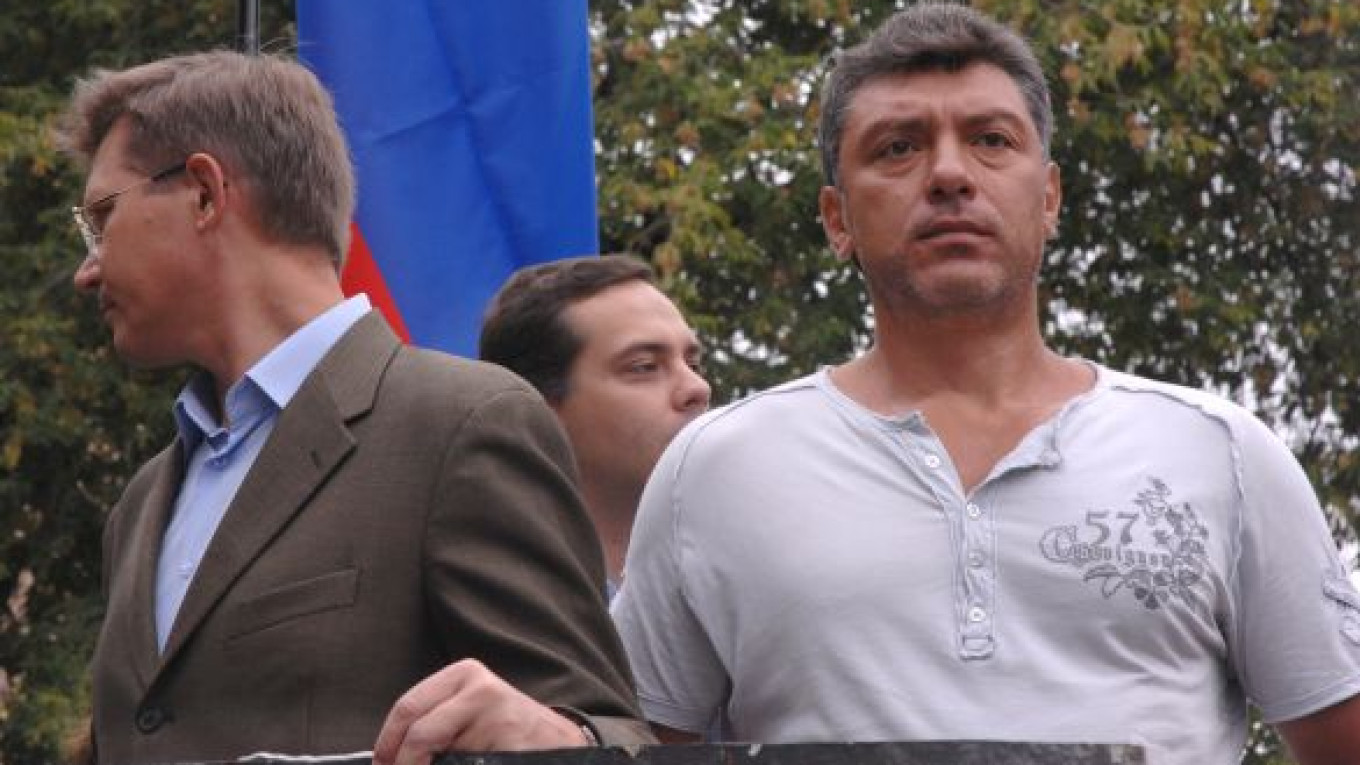The Republican Party of Russia and the Party of People's Freedom, known by its acronym Parnas, merged on Saturday to become a stronger oppositionary force.
The new party will be led by the Republican Party's Vladimir Ryzhkov and Parnas' Boris Nemtsov and Mikhail Kasyanov. Ryzhkov had previously also been a member of Parnas.
Despite its liberal roots, however, the Republican Party-Parnas may struggle to garner support from the protest movement due to a shifting political environment and the public's desire to see new faces, pundits and opposition insiders said.
Some members of the Solidarity opposition group protested the unification. They said their group, not Parnas, should have formed the backbone of a political alliance.
"The main problem for Parnas is its vertically integrated structure and the fact that some of its leaders are seen as controversial by participants in the protest movement," Solidarity member Denis Belunov said Saturday on LiveJournal.
Parnas co-leader Kasyanov's appearance at a recent mass protest on Prospekt Akademika Sakharova conjured hisses from the crowd, observers said.
At Saturday's Republican Party-Parnas congress, attended by 144 delegates from 61 regions, Kasyanov expressed confidence that a regime change is in the offing.
"In two or three years, grandiose changes will come," the former prime minister said. If oil prices fall below $60 a barrel, the current political regime's survival would be questionable, he said.
Party leaders and senior members, including Solidarity member Ilya Yashin, who joined the merged party's political council, said they stand for peaceful protests and are prepared for talks with the current authorities.
"We have to make protests peaceful," said Yashin, whose home investigators recently raided as part of a probe into violence at opposition rallies on May 6.
Some of the merged party's leaders who know Putin personally admitted that in the current situation they have no leverage to press the president to talk.
Nemtsov, a former governor who had supported Putin as he came to power, said million-person rallies might be a viable option to "force authorities to peace."
Nemtsov added that the opposition should muster the public's support by promising more financial freedom to the regions and tax relief to small businesses.
Party co-chairman Ryzhkov said he supports demands made at the December rallies, such as freeing political prisoners and holding presidential and parliamentary elections in 2013.
Still, some who attended the congress admitted that the opposition is not ready for early Duma elections due to a lack of strategy. "We still have to learn," said Sergei Alexashenko, a professor at the Higher School? of Economics.
Alexashenko, a former deputy head of the Central Bank, upheld Kasyanov's belief that the current regime's staying power is dependent on the price of oil.
"The state of the Russian economy is stable, and expensive oil allows the regime to exist," he said.
Party leaders said they would mend fences with the Yabloko social-democratic party to collaborate in regional elections.
But Yabloko's newly re-elected chairman, Sergei Mitrokhin, told reporters Sunday that "we have to agree that we will not disturb each other and then we will see."
In 2011, the Justice Ministry denied Parnas registration due to violations in documentation regarding membership. It will now be able to field candidates as part of the merged party.
Though the Republican Party of Russia was disbanded by the Justice Ministry in 2006, the party brought its case to the International Court of Human Rights in Strasbourg and was permitted to reform in 2011.
The Republican Party-Parnas will be able to take part in gubernatorial elections in October, co-chairman Ryzhkov said.
"We did not get registration out of the Kremlin's volition. We have won it," Ryzhkov said. "This victory was achieved despite the authorities."
Ryzhkov said the merged party would be ruled by a troika of leaders. "I am comfortable with that," he said.
But party insiders said that not having a single leader may prove problematic because Kasyanov, once a prime minister, may not feel comfortable serving under someone who had a lower rank.
A senior Solidarity member who requested anonymity said he couldn't see any reason for the parties to unite "since they don't have real approval ratings."
A Message from The Moscow Times:
Dear readers,
We are facing unprecedented challenges. Russia's Prosecutor General's Office has designated The Moscow Times as an "undesirable" organization, criminalizing our work and putting our staff at risk of prosecution. This follows our earlier unjust labeling as a "foreign agent."
These actions are direct attempts to silence independent journalism in Russia. The authorities claim our work "discredits the decisions of the Russian leadership." We see things differently: we strive to provide accurate, unbiased reporting on Russia.
We, the journalists of The Moscow Times, refuse to be silenced. But to continue our work, we need your help.
Your support, no matter how small, makes a world of difference. If you can, please support us monthly starting from just $2. It's quick to set up, and every contribution makes a significant impact.
By supporting The Moscow Times, you're defending open, independent journalism in the face of repression. Thank you for standing with us.
Remind me later.


